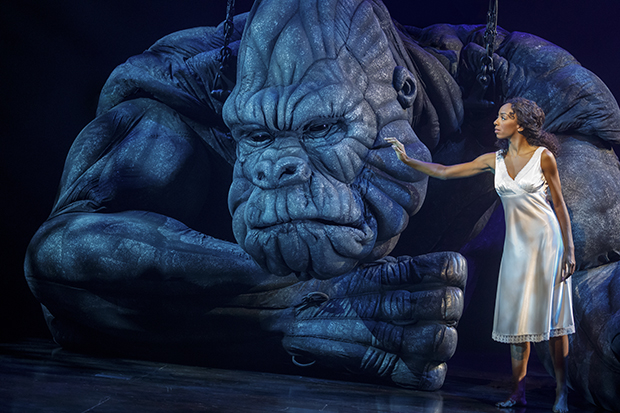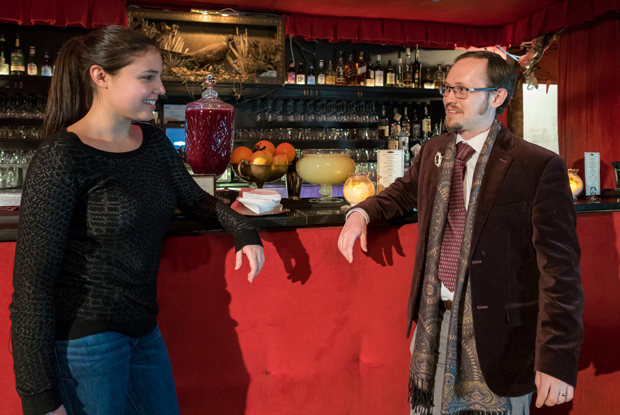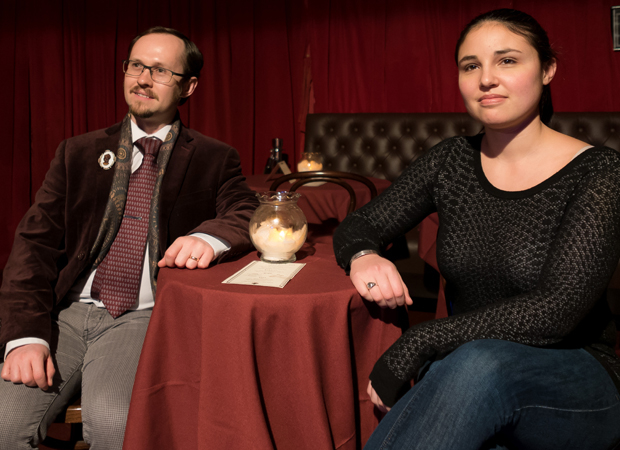Point-Counterpoint: Should Criticism Be Mean?
Our critics debate the value of aggressive reviews.
We've all read them: the particularly nasty pans that feel almost sadistic in their deployment of venomous prose. Maybe they horrify you, or maybe you live to read them. But do mean reviews accomplish anything beyond making the artist feel bad? Should theater criticism be constructive, or is the show already built and therefore fair game for the most withering words? Our critics, Zachary Stewart and Hayley Levitt, debate the purpose of meanness in criticism in their latest Point-Counterpoint:

(© Seth Walters)
Zachary Stewart: Hayley, have you ever written a review that you came to regret as too mean?
Hayley Levitt: My meanest reviews were definitely my earliest reviews when I thought I had to be snarky to be a "real" critic. Then I realized criticism shouldn't be a flashy showcase for the critic — it should be a guiding tool for audiences and a quality check for artists. You have to be honest, but being mean to increase the entertainment value of your own writing feels like a purposeless exercise in vanity.
Have you ever regretted something you've written about a show?
Zach: Regrets? I've had a few: I've never written anything that I've come to view as too mean, but I've written plenty that I now consider too nice; and I think that is a breach of duty on my part. Kenneth Tynan, longtime critic for London's The Observer, wrote, "The critic's job — at least nine tenths of it — is to make way for the good by demolishing the bad." We do our readers no service by padding our wrecking balls in bubble wrap. Sharp, clear, and brutally honest criticism should always be the goal. It may come off as mean, but it's also the truth.
Hayley: We do our readers just as much a disservice by handing them a blind demo job. As frustrated as we can get with shows that we think are subpar, it most likely took years of labor to get the thing you just dismissed as a garbage pile to the stage — and all it took from you was two-and-a-half hours of your afternoon. It's our job to give artists and their work, no matter how flawed, the reflection they deserve. That may still translate to a negative review, but there's something much less vicious about negative criticism that has digested a piece instead of just chewing on it for five seconds and vindictively spitting it out. If we're not going to be patient and considered, we have no right to claim more legitimacy than anyone with a ticket and a Twitter account.

(© Joan Marcus)
Zach: I agree with your insistence on thoughtful criticism, but so much of what is dismissed as "mean" is thoughtful. Most of the reviews for King Kong (including my own) indicted that rampage through the book musical on specific counts. Still, there was grumbling about how these reviews were overly mean and discounted all the effort put into the show. But an "E" for effort shouldn't be the passing grade for a $175 ticket. Yes, the show cost $35 million and took years to create, but it proved to be a tremendous waste of time and money. It's the critic's job to say that.
Hayley: The King Kong review that most people took issue with was the one published by The New York Times, which opted out of a traditional review in favor of a back-and-forth banter between its two lead critics (both of whom didn't like it). Regardless of what was even said, that structure wasn't intended as a way to hammer out valuable ideas — it was meant to be catty because catty is entertaining. Sure, you get readers that way, but it's a value judgment I disagree with.
To your point about money, it's absolutely the critic's job to inform audiences whether a Broadway ticket is worth the price of admission. But we have to be careful not to slip into the mentality that once a piece of theater is assigned a monetary value, it becomes an impersonal "product." Humans made it, humans are performing it, and we as humans need to receive it and respond to it with due compassion.

(© Seth Walters)
Zach: A back-and-forth banter between critics? What were they thinking?! Truly, the spectacle of that "review" was commensurate with the spectacle created onstage. We make a grave mistake when we treat adult professionals in a billion-dollar industry like 8-year-old tee-ball players in need of a participation trophy and a hug. A recently released documentary about film critic Pauline Kael addresses this exact subject. Several (mostly male) directors blamed Kael for undermining their confidence; but I would respond that if a negative review is enough to scare you off making newer, better work, then maybe you shouldn't be creating anymore. Considering there are only so many stages in the world, this goes doubly for theater.
Hayley: Look at the insane double standard that establishes: You have to be emotionally vulnerable enough to be an artist, but thick-skinned enough to be in "show biz." What you just described sounds more like a hazing ritual than a legitimate way to separate the wheat from the chaff.
Zach: Is there a better way? Theater-makers aren't the only professionals who have to shift emotional gears at work. Most of us do. And harsh criticism should not come as a surprise to any serious artist: It's been a hazard of the trade since Thespis stepped out of the chorus.

(© Seth Walters)
Hayley: The better way is to give genuine opinions in the service of a real exchange of ideas. Critics exist to converse with the work they see, not berate it, scold it, or silence it. I think that's something everyone in the business (or hobby) of public commentary could use a refresher course on these days.
Zach: What if your genuine opinion is that the play is intelligence-insulting trash? What if you cite evidence from the play to support that opinion? Readers want an honest assessment before they swipe their credit cards. We betray them when we fall into self-censorship under the pretense of nice, pleasant "conversation" (an Orwellian term in this context).
Hayley: "Intelligence-insulting" is qualitative criticism. "Trash" is name-calling. I think we need to stick to the former.
[Ed note: I offer two pieces of advice to our reviewers: Substantiate your opinion with evidence from the show; snark is lazy. And lazy gets cut. – Ashley Van Buren]









